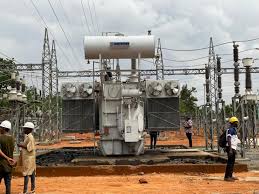By Helen Okechukwu
In an effort to address the continuing falling grid, The Transmission Company of Nigeria (TCN) has announced the commencement of repair work on the transmission line.
This was contained in a statement shared on X by the special adviser of information and strategy to President Bola Tinubu on Thursday.
In the disclosure, Ndidi Mbah, the General Manager and Public Affairs of TCN, said the blackout was caused by a sudden rise in frequency from 50.33 Hz to 51.44 Hz.
Furthermore, Mbah said as a result of the frequency spike in the transmission company, the team decided to shut the platform down to avert further complications.
However, the investigation report generated from the previous collapse noted that the occurrence of a collapsed national grid was a result of a weak transmission system, and repairs are ongoing to improve the working condition of the units.
The statement read, “The Transmission Company of Nigeria (TCN) wishes to inform the public that the national grid experienced a disturbance at approximately 11:29 AM this morning, caused by a sudden rise in frequency from 50.33Hz to 51.44Hz. Recovery efforts began immediately, and the Abuja Axis was restored within … minutes. Recovery is still ongoing.”
“The frequency spike was caused by issues encountered at one of TCN’s substations, which had to be shut down to prevent further complications. In addition to this, TCN is actively engaged in significant repair work on several critical transmission lines and substations. This includes the 330kV transmission line along the Shiroro-Mando axis, major upgrades at the Jebba Transmission Substation, and the restoration of the second Ugwuaji-Apir 330kV transmission line.”
“Furthermore, following the submission of the investigative report on the causes of previous grid collapses, TCN has begun addressing the identified weaknesses in the transmission system. Efforts are being made to close the gaps highlighted in the report and to enhance the overall stability and resilience of the grid. These efforts include both technical upgrades and strategic interventions based on the committee’s recommendations.”
“However, it is important to note that while these repairs and improvements are underway, some degree of instability in the system is likely to persist until all major works are completed. TCN acknowledges the impact of these disruptions and kindly asks for the understanding and patience of the public during this challenging period.”
Acknowledging the significant role of providing stable power in Nigeria’s socio-economic development, TCN reaffirmed its commitment to sustaining and improving the reliability of electricity supply.
Assuring the public, the company said “all necessary measures are being taken to ensure the grid’s long-term stability, in line with the recommendations of the investigative committee, while also addressing infrastructure damage such as vandalised transmission lines.”



